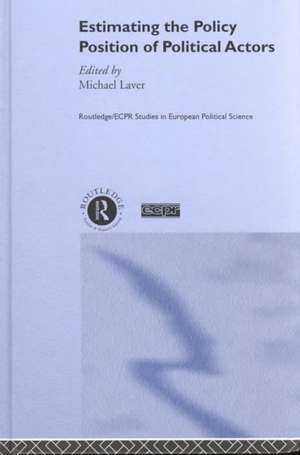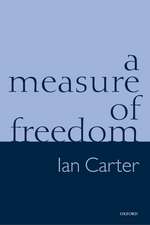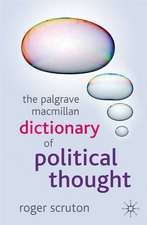Estimating the Policy Position of Political Actors: Routledge/ECPR Studies in European Political Science
Editat de Michael Laveren Limba Engleză Hardback – 3 mai 2001
Din seria Routledge/ECPR Studies in European Political Science
- 15%
 Preț: 396.41 lei
Preț: 396.41 lei -
 Preț: 416.96 lei
Preț: 416.96 lei - 18%
 Preț: 1060.52 lei
Preț: 1060.52 lei - 49%
 Preț: 545.76 lei
Preț: 545.76 lei - 18%
 Preț: 1115.33 lei
Preț: 1115.33 lei - 15%
 Preț: 240.30 lei
Preț: 240.30 lei - 18%
 Preț: 1002.63 lei
Preț: 1002.63 lei - 18%
 Preț: 1002.50 lei
Preț: 1002.50 lei - 18%
 Preț: 1111.55 lei
Preț: 1111.55 lei - 12%
 Preț: 303.01 lei
Preț: 303.01 lei - 18%
 Preț: 1118.46 lei
Preț: 1118.46 lei -
 Preț: 416.26 lei
Preț: 416.26 lei - 18%
 Preț: 1002.99 lei
Preț: 1002.99 lei - 18%
 Preț: 733.11 lei
Preț: 733.11 lei - 18%
 Preț: 1005.34 lei
Preț: 1005.34 lei - 18%
 Preț: 1112.34 lei
Preț: 1112.34 lei - 18%
 Preț: 1064.01 lei
Preț: 1064.01 lei - 18%
 Preț: 1117.43 lei
Preț: 1117.43 lei -
 Preț: 310.83 lei
Preț: 310.83 lei - 28%
 Preț: 824.17 lei
Preț: 824.17 lei - 18%
 Preț: 1112.53 lei
Preț: 1112.53 lei - 18%
 Preț: 1057.75 lei
Preț: 1057.75 lei - 25%
 Preț: 711.92 lei
Preț: 711.92 lei -
 Preț: 287.41 lei
Preț: 287.41 lei - 18%
 Preț: 1009.55 lei
Preț: 1009.55 lei - 18%
 Preț: 1002.50 lei
Preț: 1002.50 lei -
 Preț: 199.65 lei
Preț: 199.65 lei - 18%
 Preț: 1004.20 lei
Preț: 1004.20 lei -
 Preț: 413.94 lei
Preț: 413.94 lei - 26%
 Preț: 765.84 lei
Preț: 765.84 lei - 18%
 Preț: 1116.38 lei
Preț: 1116.38 lei - 18%
 Preț: 1060.87 lei
Preț: 1060.87 lei - 18%
 Preț: 1058.65 lei
Preț: 1058.65 lei - 18%
 Preț: 1058.38 lei
Preț: 1058.38 lei - 49%
 Preț: 546.84 lei
Preț: 546.84 lei - 18%
 Preț: 1108.42 lei
Preț: 1108.42 lei - 18%
 Preț: 1113.12 lei
Preț: 1113.12 lei - 28%
 Preț: 823.63 lei
Preț: 823.63 lei - 18%
 Preț: 1001.70 lei
Preț: 1001.70 lei -
 Preț: 392.24 lei
Preț: 392.24 lei - 18%
 Preț: 1002.63 lei
Preț: 1002.63 lei - 28%
 Preț: 824.53 lei
Preț: 824.53 lei - 18%
 Preț: 1112.34 lei
Preț: 1112.34 lei - 9%
 Preț: 935.80 lei
Preț: 935.80 lei - 22%
 Preț: 478.91 lei
Preț: 478.91 lei -
 Preț: 487.37 lei
Preț: 487.37 lei
Preț: 765.43 lei
Preț vechi: 1028.13 lei
-26% Nou
Puncte Express: 1148
Preț estimativ în valută:
146.46€ • 153.33$ • 121.19£
146.46€ • 153.33$ • 121.19£
Carte tipărită la comandă
Livrare economică 05-19 aprilie
Preluare comenzi: 021 569.72.76
Specificații
ISBN-13: 9780415244428
ISBN-10: 0415244420
Pagini: 272
Dimensiuni: 156 x 234 x 21 mm
Greutate: 0.52 kg
Ediția:1
Editura: Taylor & Francis
Colecția Routledge
Seria Routledge/ECPR Studies in European Political Science
Locul publicării:Oxford, United Kingdom
ISBN-10: 0415244420
Pagini: 272
Dimensiuni: 156 x 234 x 21 mm
Greutate: 0.52 kg
Ediția:1
Editura: Taylor & Francis
Colecția Routledge
Seria Routledge/ECPR Studies in European Political Science
Locul publicării:Oxford, United Kingdom
Notă biografică
Michael Laver is Professor of Political Science at Trinity College Dublin. His recent publications include: Making and Breaking Governments (with Kenneth A Shepsle; Private Desire, Political Action; and Playing Politics: the Nightmare Continues. His current research focusses on computer coded text analysis and dynamic models of party competition.
Cuprins
PART I Overview; Chapter 1 Why should we estimate the policy positions of political actors?, Michael Laver; Chapter 2 Searching for the positions of political actors, Peter Mair; PART II Expert coded text analysis; Chapter 3 Manifesto research since 1979, Andrea Volkens; Chapter 4 Validating the Manifesto Research Group approach, Ian Budge; Chapter 5 Position and salience in the policies of political actors, Michael Laver; Chapter 6 A framework for analysing local party policy emphases in Scotland, Bodil Agasøster; Chapter 7 The policy space of party manifestos, Michael D. McDonald, Silvia M. Mendes; Chapter 8 Analysing party dynamics by taking Part Ially overlapping snapshots, Wouter van der Brug; Chapter 9 Estimating interparty policy distances from election programmes in Quebec, 1970-89, François Petry, Réjean Landry; PART III Computer coded text analysis; Chapter 10 A natural sentences approach to the computer coding of party manifestos, Leonard Ray; Chapter 11 Measurement of party positions on the basis of party programmes, media coverage and voter perceptions, Jan Kleinnijenhuis, Paul Pennings; Chapter 12 The computer coding of political texts, John Garry; Chapter 13 Estimating policy positions from the computer coding of political texts, Miranda de Vries, Daniela Giannetti, Lucy Mansergh; Chapter 14 Tracking estimates of public opinion and party policy intentions in Britain and the USA, Judith Bara; PART IV Conclusion; Chapter 15 How should we estimate the policy positions of political actors?, Michael Laver;
Descriere
This book gives an up to date reference on the state of the art in this highly important methodological area, which is central both to theoretical models of party competition and to empirical accounts.













